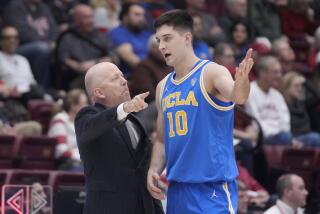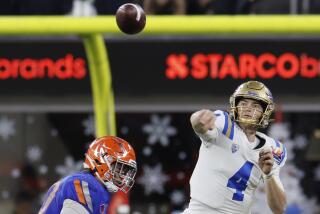UCLA Students Get the Word Out About Slang : Language: A sampler of UCLA-speak is a hot seller on campus. An expanded version is due from Random House in February.
Not too long ago, linguistics professor Pamela Munro didn’t know a “beauhunk” from a “goob.”
Then she started assigning her students at UCLA to collect slang terms. And last fall, after students in her Linguistics 88A seminar had collected and compiled an extensive list, they decided they had the makings of a book.
The result, a dictionary called “U.C.L.A. Slang,” is a hot item in the bookstore at “Pretty People University” (UCLA). Now, even the most uncool “remos” (nerds) on campus who may “jones for” (really want) popularity can use the dictionary to learn what’s hip.
More than 2,300 copies have been sold locally. The dictionary has been so well received that Harmony Books, which is a part of Random House, has picked it up for publication and will release a more comprehensive version under the title “Slang U,” expected to reach bookstores by early February.
Although excited over the dictionary’s success, Munro is taking the hoopla--not to be confused with “brewhaha,” which at UCLA means beer--in stride.
“I think everybody is interested in slang,” she said. “A lot of the expressions in the dictionary are funny.”
The dictionary is popular not just among the school’s “beauhunks” (gorgeous men) and “bettys” (gorgeous women), “goobs” and “dweebs” (nerds of any sex), and “way fashionable studs.” Parents are also getting in on the action.
“I’ve had a number of parents say they bought the dictionary so they could understand what their child is saying,” Munro said. “Some read it and say they can’t believe people are saying these things.”
A linguistics professor at UCLA since 1974, Munro said she was turned on to the richness of slang in 1981 by Connie Eble, a professor at the University of North Carolina at Chapel Hill who publishes papers on campus slang each year.
The use of slang is nothing new, Munro noted. One of its functions is to help define distinct social groups.
Munro said the ephemerality of slang is unpredictable. “Some slang words stay around and some don’t,” she said. “It’s really hard to say which ones will last.”
Although some of the entries in the dictionary are common to campuses across the nation, Munro said many are unique to “Joe and Josephine Bruins” (UCLA students).
Slang, she said, comes from a variety of sources. Some terms are adaptations of existings words, some are compounded or come from standard vocabulary, and others are words picked up from television and movie characters.
For example, Munro cited a popular saying that is not listed in the campus dictionary but will be in the Harmony Books version: “Sally,” a name given to a woman who is compulsive and meticulous. It comes from the movie “When Harry Met Sally,” Munro said.
Although the study of slang is only a small portion of her work, Munro said it has been enlightening.
“If you study any kind of language, you learn a great respect for the human brain,” she said. “There are clever minds that come up with these slangs, and you think, ‘How did someone come up with this?’ ”
No doubt the students at UCLA think it’s “no biggie.” They come up with slang terms “24-7” (all the time, derived from 24 hours a day, seven days a week).
‘U.C.L.A. SLANG’: A SAMPLER
Here is a sampling of words and expressions found in “U.C.L.A. Slang”:
adonis--extremely nice-looking, breathtaking; used as a noun or adjective.
bag on--to talk badly about, criticize.
be illin--to be in a bad or unfortunate situation; to act stupid.
couch commander--a TV remote control, or the person holding it.
duck--a geek, or totally uncool person.
filet--cute girl.
foof--superficial person.
fossil--person who has been in college more than four years.
get sloppy--to have sex.
homie--close, dependable friend; buddy.
lifejacket--condom.
Location joke!--You had to be there.
mick--easy class or course (short for Mickey Mouse).
M.O.S.--member of the opposite sex.
nail jelly to a tree--to do the impossible.
nasty--sexually attractive.
nisty--very ugly.
Tina Tridelt--someone female who is incredibly superficial-looking or acting; may or may not be in a sorority.
University of Second Choice--University of Scholastic Compromise, etc. are references to a certain rival institution across town.
More to Read
Sign up for our Book Club newsletter
Get the latest news, events and more from the Los Angeles Times Book Club, and help us get L.A. reading and talking.
You may occasionally receive promotional content from the Los Angeles Times.








